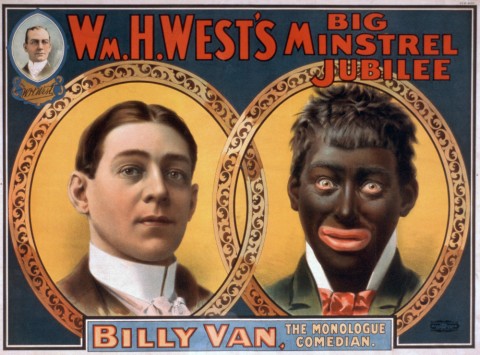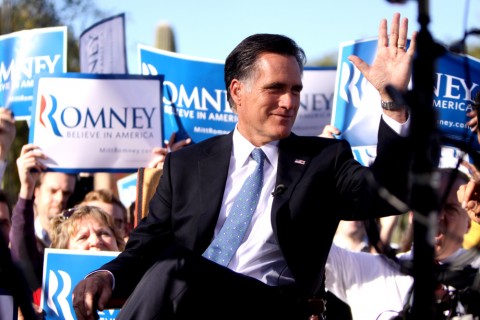In grandfather’s day, one minstrel recalled, men were judged by merit, not money; styles were sensible; young men did not ogle girls; married men were faithful; politicians were honest; and there was no war. One hundred years ago, another intoned, farmers did not cut their legs off with mowing machines; there were few divorces; lamps did not explode and kill people; there were no “Turkish harems at Salt Lake”; young women did not lose status if they did a little work; everyone made his own clothes; and everybody was honest.*
Sound familiar? What if I added: because there were fewer regulations and lower taxes. Starting to sound familiar now?
The specifics of the complaints are certainly different, but the tone is just the same: like the minstrels of the post-Civil War period — those performers in burnt cork who borrowed blackness for the light entertainment of white audiences — the 2012 Republican platform trades on a kind of diffuse nostalgia for a more prosperous American epoch to garner attention and pander for votes, and to indict their opponents on grounds no more substantial than an inclination to look forward, not back — because back is not always such a forgiving place.

Molly Ball, writing recently in The Atlantic, has the right of it. Candidate Romney, she writes, is a dyed-in-the-wool nostalgic at heart. He bemoans Obama’s radical impulse to “transform America” and proposes, instead, that America be “restored.” On foreign policy, he longs for better days — for the doctrine of all modern presidencies — from Truman, to JFK, to Reagan, to Bush — of peace through strength (as though this current president is not cut from the same amoral cloth). Even his Super PAC, she writes, trades on a kind of nostalgic rhetoric of what a President Romney would do — he’ll Restore our Future. Whatever that means.
And she points us toward a speech by candidate Mitt– March 30th, in Wisconsin — that makes the case more convincingly than she ever could. In it, Romney piously intones: I don’t want to transform America; I want to restore the values of economic freedom, opportunity, and small government that have made this nation the leader it is. He tells us that the fundamental question that we should ask ourselves as we move toward the elections is: are we keeping faith with the great legacy – and trust – that has been handed to us by previous generations?
Romney, and his Republican cohort, look backwards for exactly the same reason that the blackface minstrels did. Our time, like theirs, is tumultuous. Like them, we have a weak economy (two major depressions in twenty years crippled growth through much of the last quarter of the nineteenth century). Like them, we worry about immigration (Eastern and Southern European newcomers seemed like a mortal threat to national unity). And like them, the spectre of generational conflict and moral decay threatens to catapult the nation into rank decadence (urbanization and waning religiosity scared the heck out of the Gilded Age’s old guard).
But the GOP has more in common with the minstrel stage than just their concerns. Like those burnt cork players, they’re giving scared Americans a good show, but one that’s ultimately empty. Robert Toll — from whom I lifted that opening quotation — writes that the thing about minstrels is that they don’t offer any solutions. The point of the act is to put butts in seats and money in their own coffers. Not to offer substantive critique.
And that’s what we’re getting here. Candidate Romney tells us that the President has most certainly failed to lead us from recession to recovery. He tells us that in Obama’s Government-Centered Society, the government must do more because the economy is doomed to do less. But does he offer a substantive alternative vision? Hardly. What he says is that he wants to restore the freedom and opportunity that have made America the most powerful economy in the world. Because freedom and opportunity are great! Like puppies and apple pie! His are the kind of happy generalizations of a musical review, or a motivational speaker, whose goal is to put butts in seats. When it comes to policy specifics — well, he’ll tell you after he’s elected.
The reason I’m making this comparison is not because I want to rag on Mitt Romney. It’s certainly not because I want to imply that he, or his GOP colleagues, hold to the same sort of frothing racism of their Gilded-Age stage counterparts. Nor is it to dismiss the GOP by pointing out that theirs is a kind of vaudevillian dog-and-pony show — as opposed to a serious political party.
My purpose here is to point out to you the other side of that coin. Nostalgia like this works because the people who engage in it most fervently imagine the world to be considerably smaller than it is. They imagine “us” to be an “in” group — whites, or native-born Americans, baby-boomer-aged men, or folks from “real America,” as Sarah Palin was so fond of saying in the last presidential election. Candidate Mitt does this again and again: his immigration policy, his attitudes toward women, even his tax policy are all about making the world small — about speaking to people who look and act a lot like Mitt Romney himself.
But the other side can’t afford to do that. As Molly Ball points out: for President Obama, the past — most definitely — was the bad old days. Sometimes, he’s talking specifically about the economic and foreign policies of the Bush administration. But sometimes it’s broader than that. While for Romney, the past is a place of comfort and security — the hallowed promise of America, now vanished — for President Obama, it’s the 1950s. A time of segregated schools and unequal pay. A time of sexism and racism, where couples like his parents opened themselves up to prosecution, and where people like himself, with his skin tone — most definitely — could never ever aspire to be President.

Romney’s GOP, in other words, resorts to nostalgia because they can. Because the segment of the population to whom candidate Mitt is speaking remembers the past as brighter, more homogeneous, less filled with scolds telling them to be politically correct and cranks telling them to curb their mass consumption.
But walk out of that little tent, and the United States looks different. Ours is a nation made up of people on the butt end of minstrel humor, and on the short end of the nostalgic past. Sometime soon those people will open the newspapers and realize that what candidate Mitt is doing is singing “Mammy” at them. And we can only hope that that happens before November 6th.
*Robert Toll, “Social Commentary in White Minstrelsy.” In Inside the Minstrel Mask, edited by Annemarie Bean, et al. (Wesleyan U P: 1996): 104.
It is worth noting, in this quote, that the “Turkish harems” portion of the quotation is a direct attack on Mitt Romney’s religion. Mormonism remains a contentious issue on the Religious Right, even today. But I would contend that one of the effects of “blacking up” is that common whiteness transcends issues like religious difference.